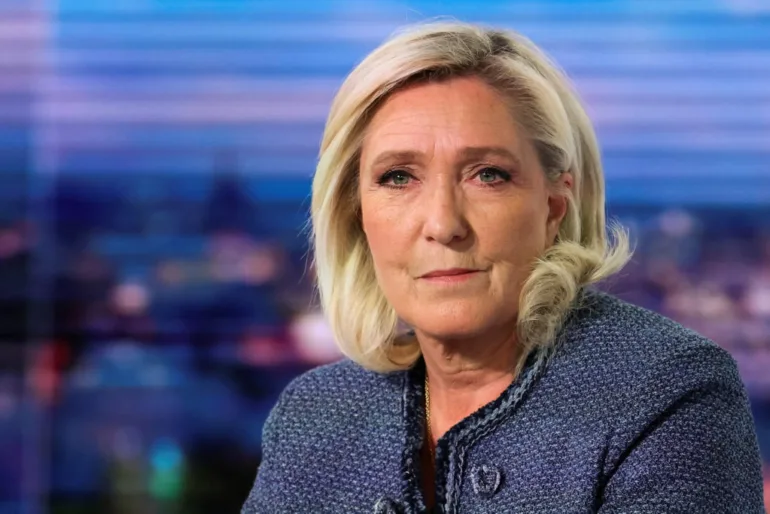Marine Le Pen, leader of France’s far-right National Rally (RN), fiercely criticized a court ruling on Monday that imposed a five-year ban on her running for public office.
The ban stems from a conviction for creating fake jobs in the European Parliament for her party members—charges she adamantly denies. The ruling stunned Le Pen, particularly as the judge ordered the ban to take effect immediately.
If upheld, the decision would block Le Pen from pursuing a fourth presidential bid in 2027, despite widespread analysis suggesting she had her strongest chance yet of winning the Elysee. The ruling sent shockwaves internationally, drawing condemnation from the Kremlin, billionaire Elon Musk, and hard-right European politicians, including Hungarian Prime Minister Viktor Orban and Dutch populist Geert Wilders.
In addition to the ban, Le Pen received a four-year prison sentence, though she will not serve jail time. Two years of the sentence are suspended, while the remaining two will be served under an electronic bracelet. She was convicted in connection with a scheme to misuse European Parliament funds, employing assistants who, in fact, worked for the RN party in France. Twenty-four people, including Le Pen, were convicted as part of the scheme.
Le Pen rejected the verdict as a “political decision” and vowed to appeal, declaring in an interview with TF1 that she would not retire from politics. “I will fight this,” she said, referring to her legal options. “I’m not going to let myself be eliminated like this.” Le Pen described herself as the “favourite” to win the 2027 election, claiming the judge’s verdict was motivated by a desire to prevent her from running. She further criticized the ruling, likening it to practices found in “authoritarian regimes.”
Despite acknowledging that the ruling left her “eliminated” from the race, Le Pen expressed confidence in her legal challenge. She promised to file her appeal quickly and urged the judiciary to expedite the process.
Le Pen’s legal woes came as the RN emerged as the largest party in the French parliament following the 2024 legislative elections. Polls indicate that she would easily top the first round of the 2027 presidential vote and make it to the second-round run-off. With President Emmanuel Macron barred from seeking a third term due to a constitutional two-term limit, Le Pen had hoped this would be her best opportunity for victory.
Following the verdict, Le Pen stormed out of the courtroom before the prison sentence was announced, prompting an emergency meeting at RN headquarters in Paris. The court’s decision also sparked outrage from her supporters, with one of them, Jacqueline Bossuyt, saying, “It’s disgraceful! They’ve destroyed her.”
The reaction to the ruling was swift, with Kremlin spokesperson Dmitry Peskov denouncing the move as part of a broader trend of “violating democratic norms” in Europe. Tesla CEO Elon Musk echoed this sentiment, comparing Le Pen’s legal struggles to those of former U.S. President Donald Trump, who has faced similar legal challenges. Musk warned that such moves could “backfire.”
In France, political figures across the spectrum expressed concern over the ruling. Laurent Wauquiez, leader of the right-wing Republicans, stated that “political debates should be decided at the ballot box,” while Prime Minister François Bayrou, though not directly commenting on the case, was reportedly “troubled” by the outcome.
Should Le Pen be barred from the 2027 race, her fallback plan is her 29-year-old protégé, Jordan Bardella, currently the RN party leader. However, some within the RN question whether Bardella has the political experience to succeed in the presidential race.
Le Pen, who has led the RN since 2011, is credited with distancing the party from her father Jean-Marie Le Pen’s controversial legacy. The case involved allegations that the RN used a €21,000 monthly allowance from the European Parliament to pay for staff who did not perform any parliamentary duties, instead working for the party. The judge confirmed that these individuals were indeed working for the RN, not performing any tasks related to the European Parliament.
As the appeal process begins, the legal and political ramifications of the ruling are expected to reverberate through France and beyond.
AFP


